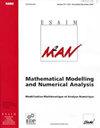时间相关麦克斯韦方程组的新半离散哈密顿HDG方法的先验误差分析
IF 1.9
3区 数学
Q2 Mathematics
Esaim-Mathematical Modelling and Numerical Analysis-Modelisation Mathematique et Analyse Numerique
Pub Date : 2023-05-25
DOI:10.1051/m2an/2023048
引用次数: 0
摘要
本文首次用杂化不连续伽辽金(HDG)方法对计算中引入的时变麦克斯韦方程组进行了一类空间离散的先验误差分析。方法:。动力机械。Engrg。,第396卷,论文。第114969号,27页,2022年。这些离散化的显著特征是,它们显示了原始麦克斯韦方程组的哈密顿结构的离散版本。这就是为什么它们被称为“哈密顿”HDG方法。因此,当与辛时间推进方法相结合时,所得到的方法显示出不随时间漂移的能量。我们对这些方法中的几种方法进行了单一的分析,利用了它们只在近似空间和稳定函数的选择上有所不同的事实。我们还介绍了一种新的离散静态麦克斯韦方程组的方法,以便用与我们的分析方法一致的方式来定义初始条件。最后,我们给出了数值测试来验证我们的理论收敛顺序,并探讨了该方法在我们的分析未涵盖的情况下的收敛性质。本文章由计算机程序翻译,如有差异,请以英文原文为准。
A priori error analysis of new semidiscrete, Hamiltonian HDG methods for the time-dependent Maxwell's equations
We present the first a priori error analysis of a class of space-discretizations by Hybridizable Discontinuous Galerkin (HDG) methods for the time-dependent Maxwell's equations introduced in Comput. Methods Appl. Mech. Engrg., vol. 396, paper. No. 114969, 27 pages, 2022. The distinctive feature of these discretizations is that they display a discrete version of the Hamiltonian structure of the original Maxwell's equations. This is why they are called "Hamiltonian" HDG methods. Because of this, when combined with symplectic time-marching methods, the resulting methods display an energy that does not drift in time. We provide a single analysis for several of these methods by exploiting the fact that they only differ by the choice of the approximation spaces and the stabilization functions. We also introduce a new way of discretizing the static Maxwell's equations in order to define the initial condition in a manner consistent with our technique of analysis. Finally, we present numerical tests to validate our theoretical orders of convergence and to explore the convergence properties of the method in situations not covered by our analysis.
求助全文
通过发布文献求助,成功后即可免费获取论文全文。
去求助
来源期刊

CiteScore
2.70
自引率
5.30%
发文量
27
审稿时长
6-12 weeks
期刊介绍:
M2AN publishes original research papers of high scientific quality in two areas: Mathematical Modelling, and Numerical Analysis. Mathematical Modelling comprises the development and study of a mathematical formulation of a problem. Numerical Analysis comprises the formulation and study of a numerical approximation or solution approach to a mathematically formulated problem.
Papers should be of interest to researchers and practitioners that value both rigorous theoretical analysis and solid evidence of computational relevance.
 求助内容:
求助内容: 应助结果提醒方式:
应助结果提醒方式:


